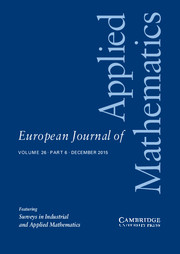Article contents
Stability of weakly dissipative Reissner–Mindlin–Timoshenko plates: A sharp result
Published online by Cambridge University Press: 27 April 2017
Abstract
In the present article, we show that there exists a critical number that stabilizes the Reissner–Mindlin–Timoshenko system with frictional dissipation acting on rotation angles. We identify two speed characteristics v12:=K/ρ1 and v22:=D/ρ2, and we show that the system is exponentially stable if and only if
 \begin{equation*}
v_{1}^{2}=v_{2}^{2}.
\end{equation*}
\begin{equation*}
v_{1}^{2}=v_{2}^{2}.
\end{equation*}
Keywords
- Type
- Papers
- Information
- Copyright
- Copyright © Cambridge University Press 2017
References
- 5
- Cited by


